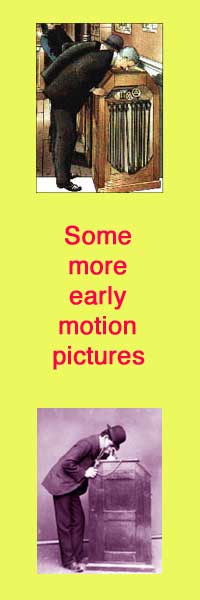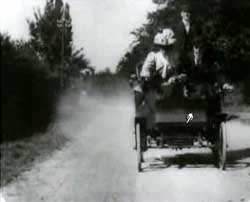 Comedy was important to the pioneer days of cinema, so that many early films record vaudeville acts, or concoct comic episodes.
Comedy was important to the pioneer days of cinema, so that many early films record vaudeville acts, or concoct comic episodes.
For Cecil M. Hepworth's How It Feels to be Run Over (1900), a camera has been placed in a dusty road & captures a passing horse & buggy.
The next vehicle, however, is a horseless carriage which runs the camera right over, as well as, in imagination, the viewer of the kinetoscopic film.
It's really quite an creative little movie, that looks like it might really have been an accidental capture, but no such thing for a film that has to be complete in under a minute. The driver is director Hepworth himself, & the well dressed passenger is May Clark
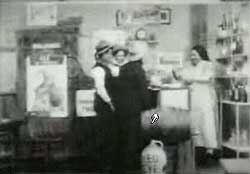 With Cripple Creel Bar-room Scene (1899), an elaborate stage design recreates a wild west saloon interio0r, with a huge jug of "Red Eye" sitting beside the bar.
With Cripple Creel Bar-room Scene (1899), an elaborate stage design recreates a wild west saloon interio0r, with a huge jug of "Red Eye" sitting beside the bar.
A drunk for no good reason except being drunk knocks the hat off a man who has fallen asleep in his chair, trying to start a fight.
The proprietress squirts the drunk with seltzer to try to calm him down, but he has to be thrown out of the bar. The guys who were playing poker stage right helped the proprietrice, who rewards them with free cigars.
It seems an awfully lot of stage design & big cast of six to create a mere three-quarters-minute show. It's considered a historical moment for the nascent cinema, however, in establishing the western saloon setting for oh so many future westerns, & is sometimes tagged "the first western."
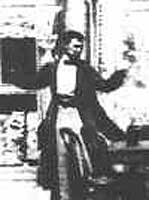 Ah, the very first Sherlock Holmes film, Sherlock Holmes Baffled (1903),but with a satiric "story" completely unrelated to any written tale we may know. It's a half-minute of nonsense.
Ah, the very first Sherlock Holmes film, Sherlock Holmes Baffled (1903),but with a satiric "story" completely unrelated to any written tale we may know. It's a half-minute of nonsense.
A burglar can appear & disappear at random. Holmes tries to ignore him by smoking a cigar, then tries to reclaim the sack of stolen goods, but the sack vanishes from his hand. It is so ridiculous to think the baffled man is Holmes that it really is good for a laugh.
It would be a delight to have known who the actor was who first brought Holmes to moving pictures, but his identity is uknown. The precise date of production is unknown, probably 1900, though its copyright date is 1903.
The occasionally suggested 1905 date doesn't match the 1903 copyright & is probably just a confusion for the lost Vitagraph film The Adventures of Sherlock Holmes; or, Held for Ransom (1905).
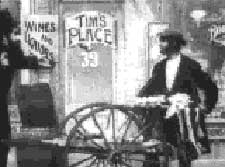 The director of Sherlock Holmes Baffled was Arthur W. Marvin, who lie James H. White & others liked recording vaudeville entertainers, including the following three shorts:
The director of Sherlock Holmes Baffled was Arthur W. Marvin, who lie James H. White & others liked recording vaudeville entertainers, including the following three shorts:
Hester Street was the business district of a Jewish neighborhood, & some race stereotyping can be detected in the vaudeville skit A Gesture Fight in Hester Street (1903), but it's not hateful.
On a stage with backdrop decorated as Hester Street, a Jewish street vendor is hawking ties. Another bearded vendor comes by with a push-cart, & an argument begins with exaggerated physical gesturing quickly escalates to a fight. An Irish cop intervenes, using his bil |
